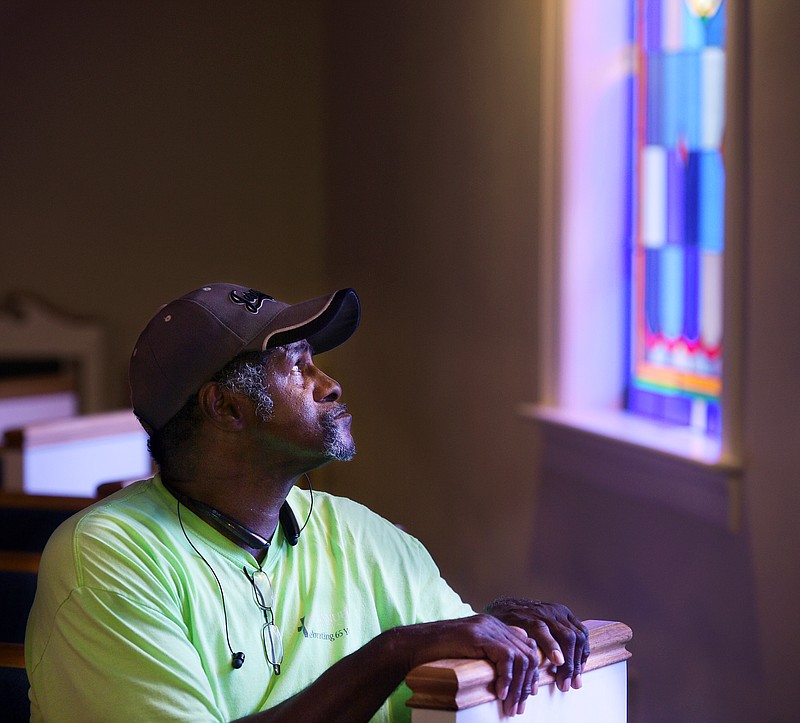LEBANON, Tenn. (AP) - Lawrence McKinney still has an easy smile after serving 31 years in prison for rape, a crime he never did.
"I take things one day at a time, and I put my faith in the Lord," said McKinney, who lives in Wilson County. "I know God has the last say so."
But McKinney has a new struggle. He's seeking a formal exoneration, which would fully clear his name and allow him to file for compensation with the state. The process has been mired in red tape and has dragged on for years since his 2009 release from prison.
"Being exonerated would put me on a standard with everyone else in society," McKinney said. "I didn't get a chance to build a career or buy a home. I lost all my 20s, 30s and 40s, but I'm a servant of Lord and any blessing I get I just want for my wife."
McKinney, who just turned 60, was found guilty in 1978 after he was accused of raping a woman in Memphis and stealing her television. He was incorrectly identified as another man. McKinney was never at the scene of the crime.
The court sentenced him to 100 years in prison on the rape charge and 10 to 15 years for the burglary. But new DNA evidence cleared McKinney, and he was released from prison in 2009.
Getting out of prison is just one step. McKinney still wants the more formal exoneration. The quest has been a confusing struggle to provide all of the required documents - even with the help of his pastor, John Hunn of Immanuel Baptist Church in Lebanon, and state Rep. Mark Pody, R-Lebanon.
The Tennessee Board of Parole confirmed recently it has received the necessary information needed to review and make a recommendation to Gov. Bill Haslam, who ultimately decides exoneration requests. McKinney said he has never received a settlement for his time in prison.
"We're thrilled," Hunn said. "It's the first time the ball is in their court where we wanted it to be for seven years. We've had the burden of proof. Lawrence has handled this so much better than I have."
Although he is no longer behind bars, McKinney still has to prove his innocence. For instance, from 2010 to 2012, McKinney received Social Security payments only to be told he was overpaid and owed about $13,000. McKinney has paid nearly all of it back, with just $500 remaining as of last month.
McKinney works at Hunn's church and has always tried to hold at least one other job. Recently, he's been looking for a night shift position so he can help with his wife's medical needs and is being trained in forklift operations, he said.
Getting McKinney's record expunged was also a cumbersome process despite being released from prison, which Hunn said took about two years. Expungement is a judicial process to clear a person's record of a conviction. Exoneration is an additional declaration of innocence awarded by the state and requires written legal documentation.
It's McKinney's second try for exoneration. He applied the first time shortly after his release, but the parole board didn't recommend it, and then-Gov. Phil Bredesen never acted on his case, according to Tennessee Board of Parole spokeswoman Melissa McDonald. McKinney was never told why.
One possibility is that McKinney approached a parole hearing with an acknowledgment of guilt 28 years into his prison sentence in a desperate hope to get out early - all before the DNA evidence cleared him.
"You can't say ... 'I didn't do it,'" McKinney said.
There were also a couple physical altercations McKinney had in prison. But, overall, McKinney got time off for good behavior, according to Hunn.
"This man lost a lot of his life in a spot he wasn't supposed to be," Pody said. "There needs to be some closure. It's very frustrating, the pace of government, even in my position as state representative. I don't think we should continue to add to the dilemma by moving at the pace we are."
McKinney came to Wilson County after his release, which is where his wife, Dorothy, lived. The couple married in 2010 after becoming pen pals while McKinney was in prison.
As a member of Immanuel Baptist, McKinney has been active in Bible studies, mission trips and a jail ministry. He also visits hospital patients, comparing their need for visitors to prison inmates.
"He looks at everything through spiritual eyes," said Rodney Cathey, general manager of the Lifeway Christian Resources distribution center in Lebanon where McKinney also has been employed. "Lawrence worked hard. He was concerned about doing a good job. It's striking he's not bitter at all. Through his faith in Christ he has found true peace."
Pody is expecting a recommendation in four to six weeks on the latest application before it goes to Haslam, though McDonald said the time frame is undetermined. The governor is not bound to follow the recommendation.
If he is exonerated and is able to file a claim, he'll still have more bureaucracy to go through. He'll need to work with the Tennessee Board of Claims. Since 2003, the board has paid out two exoneration claims, spokeswoman Shelli King said. Factors considered when deciding claims include the person's physical and mental suffering and loss of earnings, King said. Total compensation cannot exceed $1 million.
For McKinney, it's one day at a time as he works to earn back his life and the respect of others.
"When I went on a jail ministry, one of the guards escorting me said, 'How are you doing sir?'" McKinney said. "What a feeling, that I was somebody someone could respect."
___
Information from: The Tennessean, http://www.tennessean.com
